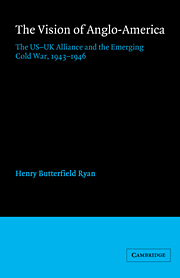Book contents
- Frontmatter
- Contents
- ACKNOWLEDGEMENTS
- INTRODUCTION
- PART I STRENGTHENING THE TIES: THE EFFORT AND THE PROBLEMS
- PART II FOREIGN CRISES THAT DEMONSTRATE GREAT BRITAIN'S PROBLEMS
- INTRODUCTION
- 5 Background and build-up
- 6 Involvement of Great Britain and the United States
- 7 Yalta and after
- 8 Truman: the new factor
- 9 The gathering for the San Francisco Conference
- 10 Between San Francisco and Potsdam
- 11 Concluding thoughts on the Polish crisis
- 12 Background of the crisis
- 13 1944, the critical year
- 14 The role of the press
- 15 The crisis peaks
- 16 America dives in
- CONCLUSION
- NOTES
- BIBLIOGRAPHY
- INDEX
11 - Concluding thoughts on the Polish crisis
from PART II - FOREIGN CRISES THAT DEMONSTRATE GREAT BRITAIN'S PROBLEMS
Published online by Cambridge University Press: 07 December 2009
- Frontmatter
- Contents
- ACKNOWLEDGEMENTS
- INTRODUCTION
- PART I STRENGTHENING THE TIES: THE EFFORT AND THE PROBLEMS
- PART II FOREIGN CRISES THAT DEMONSTRATE GREAT BRITAIN'S PROBLEMS
- INTRODUCTION
- 5 Background and build-up
- 6 Involvement of Great Britain and the United States
- 7 Yalta and after
- 8 Truman: the new factor
- 9 The gathering for the San Francisco Conference
- 10 Between San Francisco and Potsdam
- 11 Concluding thoughts on the Polish crisis
- 12 Background of the crisis
- 13 1944, the critical year
- 14 The role of the press
- 15 The crisis peaks
- 16 America dives in
- CONCLUSION
- NOTES
- BIBLIOGRAPHY
- INDEX
Summary
Although the United States has often been seen as the key Western power in the Polish crisis, a close look at the Anglo-American dimension of the dispute shows that the US was, particularly in comparison with its British ally, quite a reluctant dragon. Furthermore, it becomes clear that during the Roosevelt years two very different philosophies of international politics, that of his Administration and that of Churchill's Government, competed with each other as the Western powers tried to deal with the Polish question. There is every reason to believe that Roosevelt, and probably Truman as well, would have allowed that question to be settled with much less confrontation and friction than actually resulted had they not been continually ‘stiffened’ by the British. Roosevelt would have done so if for no other reason than to preserve his vision of triangularity as the foundation of the postwar world. Truman would have done so simply to keep the Russians in the war, which was, of course, one of Roosevelt's motives also. For Churchill, however, convinced that the best hope for the future was a Pax Britannica–Americana, the Polish issue was part of the first serious challenge that the US–British consortium had to meet, the challenge of an overexpansive Soviet Union. Unfortunately for him, he was unable to keep his Atlantic partners in the breach until the end of the day. Their will to fight the battle in that place at that time was eroded by strong countervailing pressures.
- Type
- Chapter
- Information
- The Vision of Anglo-AmericaThe US-UK Alliance and the Emerging Cold War, 1943–1946, pp. 117 - 120Publisher: Cambridge University PressPrint publication year: 1987

